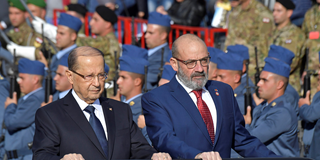God’s Middle East Playground
Lebanon, having long suffered from a combination of domestic institutions that are too weak and neighbors that are too strong, now finds itself in the crossfire between Iran and Saudi Arabia. With the war against the Islamic State in Iraq and Syria winding down, will the region's main strategic rivals shift their proxy war to Beirut?

PARIS – In his classic study of Polish history, Norman Davies describes Poland in the late eighteenth century as “God’s Playground.” That description could be applied to Lebanon today. Like Poland back then, Lebanon suffers from a combination of domestic institutions that are too weak and neighbors that are too strong.